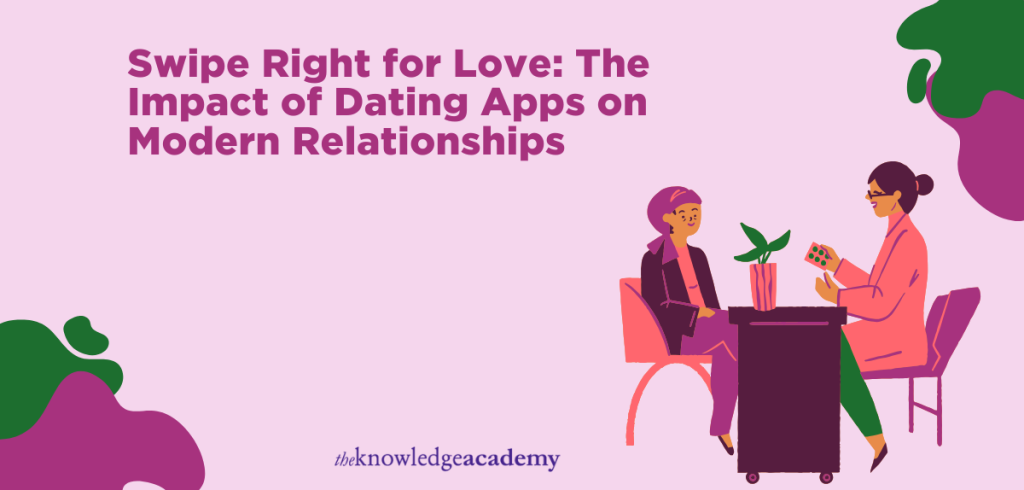Picture this: you’re scrolling through profiles, heart racing, hoping for that perfect match. Dating apps have changed the game, haven’t they? Whether you’re after love or just a bit of fun, they’ve rewired how we connect. A Mental Health Course might tell you it’s a mixed bag for our well-being, exciting yet stressful. That’s where Relationship Counselling comes in, helping us navigate the highs and lows of digital romance. These apps are everywhere, but what do they mean for love today? Let’s explore the good, the bad, and the swipes in between.
How Are Dating Apps Affecting Relationships?
Below are the most noticeable ways dating apps are impacting modern relationships and how support like a mental health course or relationship counselling can help navigate them:
Dating Apps Changed the Way People Meet
Once upon a time, relationships started with a chance encounter. Today, they begin with a swipe. Dating apps like Tinder, Bumble and Hinge have made meeting someone as easy as unlocking your phone. This convenience is great for busy people but also has its emotional dynamics.
Instant access to potential partners often leads to what’s called “choice overload.” With so many options, it can be hard to commit or even decide. Some users experience anxiety, self-doubt, or disappointment when expectations don’t match reality. That’s where self-awareness, and sometimes professional support, becomes essential.
Rise of Ghosting, Breadcrumbing and Love Bombing
Let’s be honest: online dating has introduced a new vocabulary into our love lives. Ghosting means someone disappears without explanation. Breadcrumbing happens when someone keeps you interested with occasional messages but never commits. Love bombing is when someone showers you with affection early on, only to withdraw later.
These patterns can be confusing and damaging, especially for those already dealing with past trauma or insecurity. A relationship that starts online might initially feel exciting but take an unexpected emotional toll. Couples who begin their journey through dating apps may need to unlearn some of these behaviours, and that’s where relationship counselling can be truly valuable.
Dating Apps Making Us More Anxious
Dating apps are designed to keep users engaged, much like social media. And just like scrolling through Instagram, constantly checking for matches or replies can lead to emotional fatigue. The highs of matching with someone and the lows of rejection can create a rollercoaster of emotions.
For some, this cycle can affect self-esteem and even mental health over time. Many are now seeing the benefit of learning coping strategies through a mental health course. These tools help users understand their emotions and respond to dating situations in healthier ways, especially as dating apps become a regular part of everyday life.
From Swipe to Stability in Digital Love
While dating apps often get a bad reputation, they’re not all doom and gloom. Many happy couples have met online. The key difference lies in how they handle the relationship after the match.
Building something real from a digital beginning requires open communication, emotional maturity and shared values. This is where relationship counselling comes in. For couples who met online, therapy offers a safe space to reflect on their dynamics, address insecurities and build stronger emotional foundations.
The Pressure to Be “Perfect”
Let’s not forget the role of appearance in online dating. Profiles are often curated with filtered photos and witty bios, sometimes leading to unrealistic expectations. This performance-driven space can create pressure to present a version of ourselves that isn’t quite real.
This gap between an online persona and the real-life self can cause insecurity when the relationship becomes serious. That’s why emotional honesty matters, and so does mental well-being. Couples counselling, conversely, can bridge the gap between image and authenticity in a supportive environment.
Getting Emotionally Ready to Date
One often-overlooked benefit of the dating app era is that it has made people more aware of their emotional needs, sometimes even before they meet someone. Many individuals are taking proactive steps by signing up for a mental health course or seeking therapy to understand better what they want from a relationship.
By building emotional intelligence and self-awareness first, people enter relationships with a healthier mindset. When two self-aware individuals connect, they’re more likely to grow and succeed together.
Conclusion
Dating apps have transformed the way we form relationships. While they offer new possibilities, they also introduce emotional challenges that couples must learn to manage.
Support is within reach whether you’re new to online dating or building something serious after a swipe. The Knowledge Academy provides valuable resources to help individuals and couples navigate love in the digital age.



